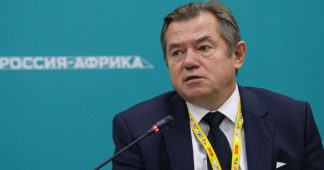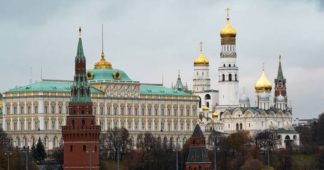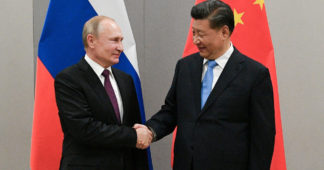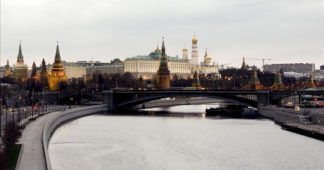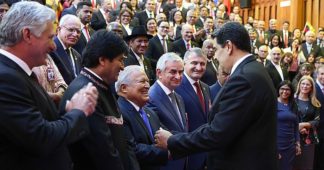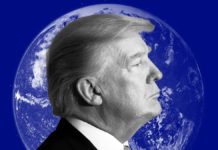In an exclusive interview with The Cradle, Russia’s top macroeconomics strategist criticizes Moscow’s slow pace of financial reform and warns there will be no new global currency without Beijing.
By Pepe Escobar
March 13 2023
The headquarters of the Eurasian Economic Commission (EEC) in Moscow, linked to the Eurasia Economic Union (EAEU) is arguably one of the most crucial nodes of the emerging multipolar world.
That’s where I was received by Minister of Integration and Macroeconomics Sergey Glazyev – who was previously interviewed in detail by The Cradle – for an exclusive, expanded discussion on the geoeconomics of multipolarity.
Glazyev was joined by his top economic advisor Dmitry Mityaev, who is also the secretary of the Eurasian Economic Commission’s (EEC) science and technology council. The EAEU and EEC are formed by Russia, Belarus, Kazakhstan, Kyrgyzstan, and Armenia. The group is currently engaged in establishing a series of free trade agreements with nations from West Asia to Southeast Asia.
Our conversation was unscripted, free flowing and straight to the point. I had initially proposed some talking points revolving around discussions between the EAEU and China on designing a new gold/commodities-based currency bypassing the US dollar, and how it would be realistically possible to have the EAEU, the Shanghai Cooperation Organization (SCO), and BRICS+ to adopt the same currency design.
Glazyev and Mityaev were completely frank and also asked questions on the Global South. As much as extremely sensitive political issues should remain off the record, what they said about the road towards multipolarity was quite sobering – in fact realpolitik-based.
Glazyev stressed that the EEC cannot ask for member states to adopt specific economic policies. There are indeed serious proposals on the design of a new currency, but the ultimate decision rests on the leaders of the five permanent members. That implies political will – ultimately to be engineered by Russia, which is responsible for over 80 percent of EAEU trade.
It’s quite possible that a renewed impetus may come after the visit of Chinese President Xi Jinping to Moscow on March 21, where he will hold in-depth strategic talks with Russian President Vladimir Putin.
On the war in Ukraine, Glazyev stressed that as it stands, China is profiting handsomely, as its economy has not been sanctioned – at least not yet – by US/EU and Beijing is buying Russian oil and gas at heavily discounted prices. The funds Russians are losing in terms of selling energy to the EU will have to be compensated by the proposed Power of Siberia II pipeline that will run from Russia to China, via Mongolia – but that will take a few more years.
Glazyev sketched the possibility of a similar debate on a new currency taking place inside the Shanghai Cooperation Organization (SCO) – yet the obstacles could be even stronger. Once again, that will depend on political will, in this case by Russia-China: a joint decision by Xi and Putin, with crucial input by India – and as Iran becomes a full member, also energy-rich Tehran.
What is realistic so far is increasing bilateral trade in their own currencies, as in the Russia-China, Russia-India, Iran-India, Russia-Iran, and China-Iran cases.
Essentially, Glazyev does not see heavily sanctioned Russia taking a leadership role in setting up a new global financial system. That may fall to China’s Global Security Initiative. The division into two blocs seems inevitable: the dollarized zone – with its inbuilt eurozone – in contrast with the Global South majority with a new financial system and new trading currency for international trade. Domestically, individual nations will keep doing business in their own national currencies.
The road to ‘de-offshorization’
Glazyev has always been a fierce critic of the Russian Central Bank, and he did voice his misgivings – echoing his book The Last World War. He never ceases to stress that the American rationale is to damage the Russian economy on every front, while the motives of the Russian Central Bank usually raise “serious questions.”
He said that quite a few detailed proposals to reorient the Central Bank have been sent to Putin, but there has been no follow-up. He also evoked the extremely delicate theme of corruption involving key oligarchs who, for inscrutable reasons, have not been sidelined by the Kremlin.
Glazyev had warned for years that it was imperative for Moscow to sell out foreign exchange assets placed in the US, Britain, France, Germany, and others which later ended up unleashing sanctions against Russia.
These assets should have been replaced by investments in gold and other precious metals; stocks of highly liquid commodity values; in securities of the EAEU, SCO, and BRICS member states; and in the capital of international organizations with Russian participation, such as the Eurasian Development Bank, the CIS Interstate Bank, and the BRICS Development Bank.
It seems that the Kremlin at least is now fully aware of the importance of expanding infrastructure for supporting Russian exports. That includes creating international exchange trading marketplaces for trade in Russian primary goods within Russian jurisdiction, and in rubles; and creating international sales and service networks for Russian goods with high added value.
For Russia, says Glazyev, the key challenge ahead in monetary policy is to modernize credit. And to prevent negative impact by foreign financial sources, the key is domestic monetization – “including expansion of long and medium-term refinancing of commercial banks against obligations of manufacturing enterprises and authorized government bodies. It is also advisable to consistently replace foreign borrowings of state- controlled banks and corporations with domestic sources of credit.”
So the imperative way to Russia, now in effect, is “de-offshorization.” Which essentially means getting rid of a “super-critical dependence of its reproduction contours on Anglo-Saxon legal and financial institutions,” something that entails “systematic losses of the Russian financial system merely on the difference in profitability between the borrowed and the placed capital.”
What Glazyev repeatedly emphasized is that as long as there’s no reform of the Russian Central Bank, any serious discussion about a new Global South-adopted currency faces insurmountable odds. The Chinese, heavily interlinked with the global financial system, may start having new ideas now that Xi Jinping, on the record, and unprecedentedly, has defined the US-provoked Hybrid War against China for what it is, and has named names: it’s an American operation.
What seems to be crystal clear is that the path toward a new financial system designed essentially by Russia-China, and adopted by vast swathes of the Global South, will remain long, rocky, and extremely challenging. The discussions inside the EAEU and with the Chinese may extrapolate to the SCO and even towards BRICS+. But all will depend on political will and political capital jointly deployed by the Russia-China strategic partnership.
That’s why Xi’s visit to Moscow next week is so crucial. The leadership of both Moscow and Beijing, in sync, now seems to be fully aware of the two-front Hybrid War deployed by Washington.
This means their peer competitor strategic partnership – the ultimate anathema for the US-led Empire – can only prosper if they jointly deploy a complete set of measures: from instances of soft power to deepening trade and commerce in their own currencies, a basket of currencies, and a new reserve currency that is not hostage to the Bretton Woods system legitimizing western finance capitalism.
Also read
Sergei Glaziev on the Soviet collapse. An interview with Dimitris Konstantakopoulos
Two ways ahead for Europe and the former USSR | By Sergei Glaziev
We remind our readers that publication of articles on our site does not mean that we agree with what is written. Our policy is to publish anything which we consider of interest, so as to assist our readers in forming their opinions. Sometimes we even publish articles with which we totally disagree, since we believe it is important for our readers to be informed on as wide a spectrum of views as possible.
